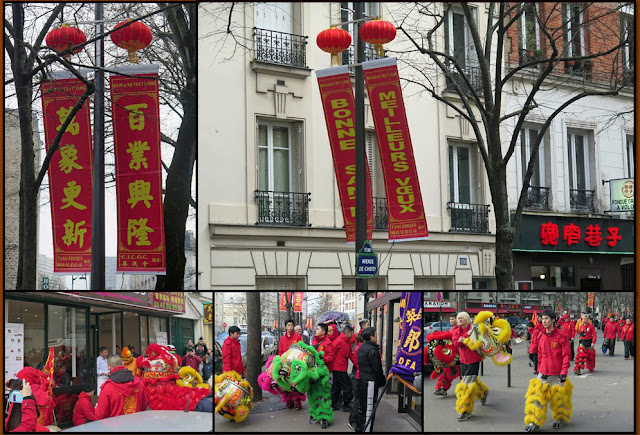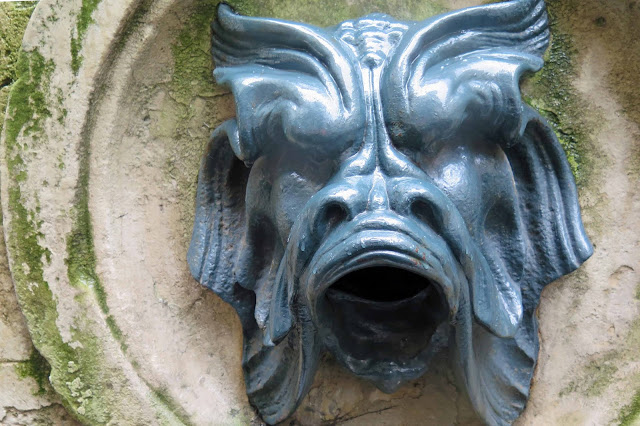26.2.18
22.2.18
Something missing...
I posted a
few times already on the statues in the Tuileries Gardens, see e.g. here, here
and here. I found a post on the excellent blog “Paris-bise-art” (also in
activity for some ten years) about the marble (?) statues that were placed here
during the 18th and 19th centuries and the article talked about in what shape these statues may be today.
I guess that we agree
that these statues need to be renovated, cleaned… and that some missing parts
should be added.
Well,
things may look bad, but there are also among the great number of statues…
… some which seem to be in perfect shape. We should also know that many of these statues
are just copies and that the originals are « in safety » inside the
Louvre Museum and that others obviously will follow.
Walking
around the Tuileries Gardens I saw some ravens (I hope I’m right – these are ravens?)...
... and that reminded me about the statue of La Fontaine and his fable “The Raven And
The Fox” to be found in the Ranelagh Gardens. I wrote about it here (and then called the raven
a crow). The poor fox has since at least a year lost its magnificent tail. (There
is actually another fable by La Fontaine about “The Fox With His Tail Cut Off”, but
that’s another story.)
19.2.18
Yes... and no.
YES, the Chinese New Year is there, but NO, the great traditional parade in the 13th arrondissement will take place only next Sunday, February 25. Some preparations, rehearsals... took place this weekend.
Labels:
Paris 13
15.2.18
Ave César
Right now
(until March 26) there is a César exhibition at Centre Pompidou. César
Baldaccini (1921-98) was a French sculptor (Italian parents). His works include
“compressions”, “expansions”, “human imprints”, “welded-metal sculptures”… e.g. the top picture, a bat.
Here are
some samples of these various techniques and uses of different materials…We can for
example see “The Thumb”, now exposed in- and outside the Centre Pompidou - a permanent large version is to be found at Paris La Défense (see previous post).
The
exhibition also shows a model of the “Centaur” – the head of which is a César self-portrait. You can find the “real” version of the "Centaur" at Place Michel Debré in Paris
(see previous post) and in a smaller version on his own grave at the Montparnasse
Cemetery (see previous post).
The French “Oscars”
are called “Césars”. The winners get a trophy created by César.
When
visiting the Centre Pompidou (see some of my previous posts here and here),
designed by the Italian architect Renzo Piano, I took a photo of another of Piano’s
achievements, the new Paris Palace of Justice (see one of my previous posts here),
soon to open.
Labels:
Centre Pompidou,
Paris 4
12.2.18
La Fontaine de Mars
The
mascaron on the top picture is to be found on a fountain, named “Fountain of
Mars” and which dates from the very beginning of the 19th century. You
can find the fountain on Rue Saint Dominique, close to an old restaurant with
the same name – “La Fontaine de Mars” (where the Obama couple and some friends
had a private dinner in 2009). The buildings which now surround the fountain were
built later during the 19th century and around the square you can
find two other also quite nice restaurants with terraces.
The mascarons did not spray any water … it was a cold and snowy day and there were no horses around like on the engraving you can see below - from when the fountain was new.
On the
front of the fountain you can see Mars, god of war and Hygieia, goddess of
health.
You can see
a sign indicating the level that the Seine flood of 1910 reached. Considering
that we are almost 600 m (650 yards) from the river, we must admit that the
present flood is “nothing” in comparison - see also the map below on the left illustrating the parts of Paris which were touched by the 1910 flood.
Labels:
Paris 7
8.2.18
Snow in my garden...
I made it
easy for me for this post… I didn’t have to leave my flat, just opened a window
a little while. My little garden offered a wonderful winter landscape … and I
was quite happy that I didn’t have to go the office this morning.
Frozen drops.
(I couldn’t
choose which picture of the same flower.)
5.2.18
Clean...
I wrote
about the Saint-Germain-des-Prés Church almost ten years ago (see here) and I
will not repeat the story about the church and the abbey, but… a few words: The
present church, which was part of the great abbey is basically from the 11th
and the 12th centuries, but a number of modifications have of
course taken place during the following centuries and the building suffered
seriously from the Revolution. During the 19th century, Victor
Baltard (1805-74) – today especially remembered for the disappeared “Les Halles”
(previous posts here) - was in charge of a restoration and he engaged Hippolyte
Flandrin (1809-64), assisted by Alexandre Denuelle (1818-79) for the decoration
of the walls – most of the walls were thus covered by paintings, but, lately, you could
hardly see this paint work anymore under the dirt.
Cleaning
and restoration of the walls and ceilings of about half of the church have just
been finished, partly thanks to sponsoring by some of today's artists. We will
obviously have to wait for at least another three years, before the whole
church will be neat. On some of the pictures below you can clearly see the
difference between the renovated and the not cleaned and restored parts.
Also
renovated, you can find the impressive tomb of John II Casimir Vasa (1609-72), a
man with a surprising career. King of Poland 1648-68, he abdicated and became abbot
of the Abbey of Saint-Germain-des-Prés during his last four years. (One could
perhaps mention that his father was King Sigismund III, grandson of Gustav I of
Sweden.) Only John Casimir’s heart remains here; he’s buried in Krakow, then the
capital of Poland.
Labels:
Paris 6,
Saint Germain des Prés Church
1.2.18
Subscribe to:
Posts (Atom)






















































